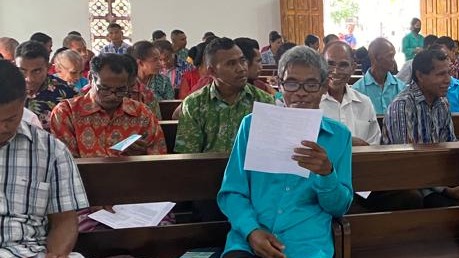Profile of Atherogenic Index in Elderly Individuals in Bitoa Village, Manggala District
Keywords:
Atherogenic index, Elderly, High density lipoprotein, TriglyceridesAbstract
The atherogenic index is a good test used to measure the level of atherogenicity associated with the risk of atherosclerosis. The atherogenic index is the logarithmic ratio of TG/HDL. Atherogenic index examination in the elderly is done to see their health status. Elderly is someone who has reached the age of more than 60 years and has experienced several changes in physiological functions that will have an impact physical and psychological conditions, including stress and emotions. The purpose of this study was to describe the profile of the atherogenic index in elderly individuals. This type of research is descriptive study with a cross-sectional approach. The amount of data used in this study were 36 subjects obtained using the purposive sampling method. The results of the study at the age of 60-64 who had the resuts of the atherogenic index in the low category there were 6 respondents and the results of the atherogenic index in the moderate category there were 8 respondents, while for atherogenic index in the high category there were 16 respondents. Ages 65-69 obtained an atherogenic index in the low category, with one respondent in the high category, comprising 5 respondents. The conclusion of this study is that the atherogenic index value at the age of 60-69 obtained an atherogenic index in the low category; there were as many as 21 respondents, and the results of the atherogenic index in the moderate category were 8 respondents, while for the atherogenic index in the high category, there were 21 respondents.
References
Abbas, M., Thaslifa, T., & Rahim, A. (2022). Atherogenic Index Profiles as Predictor of Cardiovascular Risk in Premenopausal and Menopausal Women. Journal of Health Sciences, 15(02), 160-165. https://doi.org/10.33086/jhs.v15i02.2597
Agustyanti, P. N., Pradigdo, S. F., & Aruben, R. (2017). Hubungan Asupan Makanan, Aktivitas Fisik Dan Penggunaan Kontrasepsi Hormonal Dengan Kadar Kolesterol Darah (Studi pada Wanita Keluarga Nelayan Usia 30-40 Tahun di Tambak Lorok, Semarang Tahun 2017). Jurnal Kesehatan Masyarakat, 5(4), 737-743.
Damanik, S. M., & Hasian, H. (2019). Modul Bahan Ajar Keperawatan Gerontik. Retrieved from: http://repository.uki.ac.id/2742/1/ModulBahanAjarKeperawatanGerontik.pdf
Díez-Villanueva, P., Jiménez-Méndez, C., Bonanad, C., García-Blas, S., Pérez-Rivera, Á., Allo, G., ... & Ayesta, A. (2022). Risk factors and cardiovascular disease in the elderly. Reviews in Cardiovascular Medicine, 23(6), 188. https://doi.org/10.31083/j.rcm2306188
Dong, J., Yang, S., Zhuang, Q., Sun, J., Wei, P., Zhao, X., ... & Shen, C. (2021). The associations of lipid profiles with cardiovascular diseases and death in a 10-year prospective cohort study. Frontiers in Cardiovascular Medicine, 8, 745539. https://doi.org/10.3389/fcvm.2021.745539
Hamczyk, M. R., Nevado, R. M., Barettino, A., Fuster, V., & Andrés, V. (2020). Biological versus chronological aging: JACC focus seminar. Journal of the American College of Cardiology, 75(8), 919-930. https://www.jacc.org/doi/abs/10.1016/j.jacc.2019.11.062
Katuuk, M., & Wowor, M. (2018). Hubungan kemunduran fisiologis dengan tingkat stres pada lanjut usia di Puskesmas Kakaskasen Kecamatan Tomohon Utara. Jurnal keperawatan, 6(1).
Kementerian Kesehatan Republik Indonesia. (2019). Laporan Nasional Riset Kesehatan Dasar 2018. Kementerian Kesehatan Republik Indonesia. Retrieved from: https://repository.kemkes.go.id/book/1323
Khanduker, S., Ahmed, R., Nazneen, M., Alam, A., & Khondokar, F. (2018). A comparative study of lipid profile and atherogenic index of plasma among the pre and post-menopausal women. Anwer Khan Modern Medical College Journal, 9(1), 44-49. https://doi.org/10.3329/akmmcj.v9i1.35824
Niroumand, S., Khajedaluee, M., Khadem-Rezaiyan, M., Abrishami, M., Juya, M., Khodaee, G., & Dadgarmoghaddam, M. (2015). Atherogenic Index of Plasma (AIP): A marker of cardiovascular disease. Medical journal of the Islamic Republic of Iran, 29(1), 627-635. http://mjiri.iums.ac.ir/article-1-3104-en.html
Roth, G. A., Mensah, G. A., Johnson, C. O., Addolorato, G., Ammirati, E., Baddour, L. M., ... & GBD-NHLBI-JACC Global Burden of Cardiovascular Diseases Writing Group. (2020). Global burden of cardiovascular diseases and risk factors, 1990-2019: update from the GBD 2019 study. Journal of the American college of cardiology, 76(25), 2982-3021.
Ungvari, Z., Tarantini, S., Sorond, F., Merkely, B., & Csiszar, A. (2020). Mechanisms of vascular aging, a geroscience perspective: JACC focus seminar. Journal of the American College of Cardiology, 75(8), 931-941.
Wu, T. T., Gao, Y., Zheng, Y. Y., Ma, Y. T., & Xie, X. (2018). Atherogenic index of plasma (AIP): a novel predictive indicator for the coronary artery disease in postmenopausal women. Lipids in health and disease, 17(1), 197. https://doi.org/10.1186/s12944-018-0828-z
Yulizawati, Y., & Yulika, M. (2022). Mengenal Fase Menopause. Retrieved from: http://repo. unand. ac. id/47678/1/Mengenal% 20Fase% 20Menopause% 2Bcover. pdf
Zhao, D. (2021). Epidemiological features of cardiovascular disease in Asia. Jacc: Asia, 1(1), 1-13.

Downloads
Published
How to Cite
Issue
Section
License
Copyright (c) 2025 Laboratory Journal of Infectious Diseases

This work is licensed under a Creative Commons Attribution-ShareAlike 4.0 International License.




